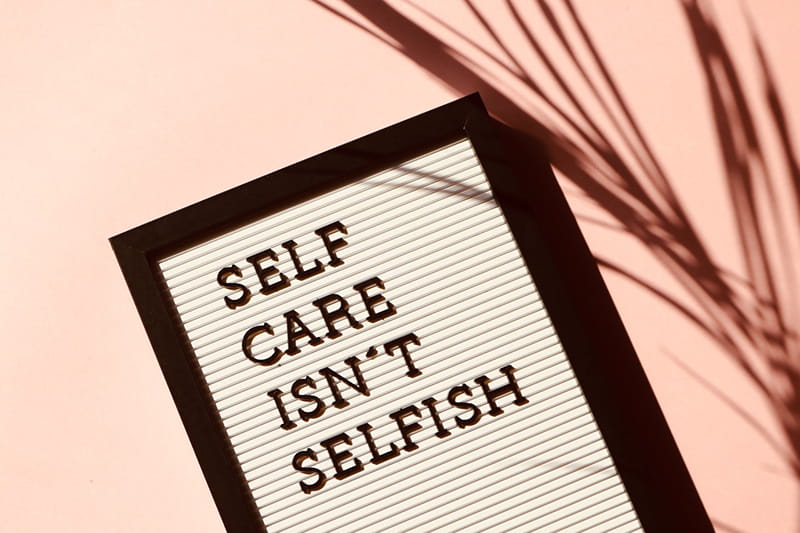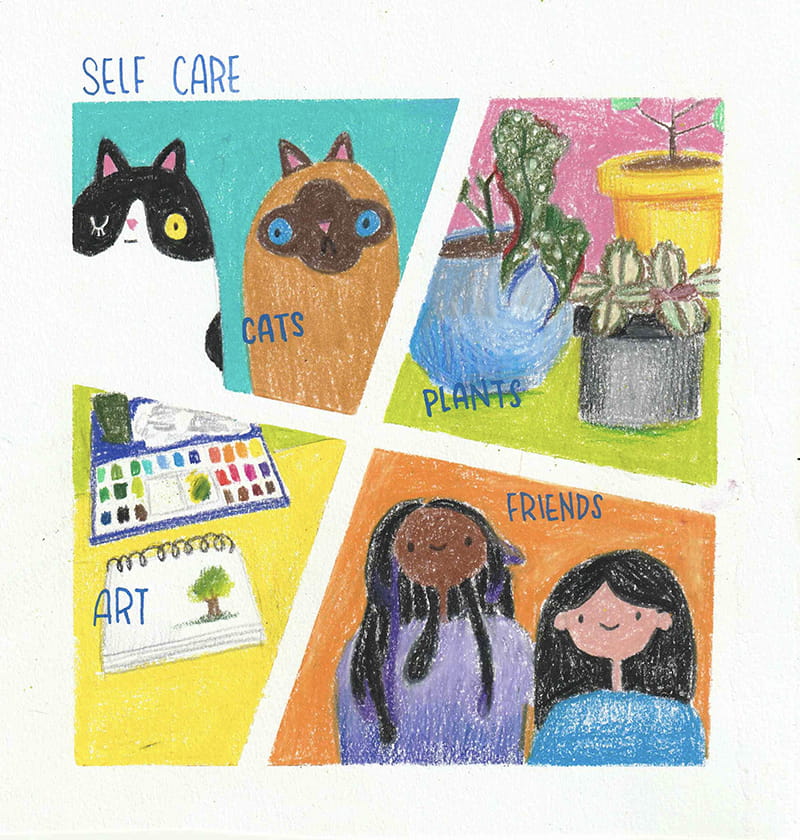One Year Later: Mental Health Tips From Drexel Students, For Drexel Students

Please visit the ‘Drexel’s Response to Coronavirus’ website for the latest public health advisories.
Though a lot has changed since the early days of the coronavirus pandemic, its effect on student mental health may be alleviating, but persists right along with the need for mask wearing, social distancing and other acts of vigilance.
To that end, three master’s students in different disciplines of creative arts therapy discussed with DrexelNow their own struggles with mental health during the pandemic, and how their fellow Dragons can remain vigilant in attending to their physical and emotional needs. They are each members of the student group Creative Arts Therapists (CATs) of Color, and previously led coping and self-care workshops through the Counseling Center.
Participants:
Alwayne Spencer — Music Therapy and Counseling master’s student in the College of Nursing and Health Professions, and vice president of CATs of Color.
Tonibelle Che – Dance/Movement Therapy and Counseling master’s student in the College of Nursing and Health Professions, and also member of CATs of Color.
Hanna Lee — Art Therapy and Counseling master’s student in the College of Nursing and Health Professions, and president of CATs of Color.
Q: What do you think is the most stressful things about being a full-time student during the pandemic?
Lee: I think for me, it's just like the lack of physical boundaries between things. It used to be that I could go to my internship and be an intern, I could go to school and be a student. But now, every role that I play, I'm it from this chair in this room. That's been kind of tough to navigate and figure out.
Che: I think for me, it's the isolation piece, because I live alone. I don't have any roommates at all. Also, having to sit through a lot of classes, to do homework, to do the reading. I'm constantly trying to find new positions in which to work, but it's really stressful for me to have to sit all the time.
Just having to walk from one class to another, go to the bathroom… or navigate from your home to the University to campus. That was a little bit of movement. Dance classes are happening online and that doesn’t work for me. I live in a studio, so I don't have space. So yeah, basically the immobility.
Spencer: I would say the most stressful thing about being a student in a pandemic is the increase of work and not being able to have a creative outlet through my music. For quite some time, at least for the last year or so, I've really been struggling to have that outlet to produce and record my own stuff just because of the increase of work … having to sit in one chair and wear many hats at the same time can be taxing. Especially when there isn’t much variation. …so that I can have a different perspective or a different mindset to work.
There’s just a different level of focus and determination that you have to have to sit and do work while also fulfilling internship responsibilities at home. When I say increase of work, it's not because the work itself increased, but it's just the fact that there isn't much space to do anything creatively because of the pandemic. So, I would usually go out and enjoy live bands or connect with other artists and sing on stage. And because that has significantly decreased, and I just have to focus on schoolwork, I think just the attention that it demands causes there to be a lack of creativity for me.

Q: With those things in mind, what might be the biggest hurdles to sound mental health for students during the pandemic?
Lee: I think just the fact that everyone is going through this at the same time, nobody knows what they're doing. Usually, if you're in a situation, you can seek support from people who have been through it or might be able to give you advice. But no one's been through this before and nobody knows what's going to happen or what they're doing. And so, I think that's a really difficult part. Our teachers don't know what they're doing if they haven't done online teaching before. Our supervisors don't know because they haven't done telehealth before. So, it's just like we're all learning at the same time, and so that's been a little bit frustrating. We're all suffering from this kind of collective trauma, too. And so, yeah, I think that's been a major hurdle for me.
Che: The levels of uncertainty are acting out like in different spheres of our lives. There's a lot of uncertainty regarding your internship, your work, how to do telehealth. If you're socially isolated, when are you going to start meeting again with people? Or if you have COVID or if you get sick, will you survive? Will you live? There's a lot of layers and layers of uncertainty. And because of that, I also think another obstacle is that everyone needs to vent out, to talk. So, whenever you talk with someone, I have noticed that everyone is wanting space to vent out and talk and not so much listen. So, yeah, that's another obstacle.
Q: What do you think are the biggest things that students might forget to do or think they don't have time for to benefit mental health during the pandemic?
Spencer: Sometimes, you forget to eat. That's a major thing. … On a few occasions, I woke up and I did all my normal hygiene stuff and then I'm straight on the computer. And once you're on Zoom, it's like you're locked into Zoom for the entire day and by the time you look around, the sun is gone, the moon is out and you're like, “Oh man, I forgot to eat.” So, I think that is something that is extremely important. Breakfast is the most important meal of the day. Even if you have just an egg and some toast, it's just so important to have that kickstarter for your brain.
Che: Cooking and grocery shopping — those are also things that I forget that are related to eating. You cannot eat if you don’t have anything to cook. Even if you have some things to cook, you need time, extra time to prepare meals, nutritious and delicious food.
Also, I think we forget that we need to move, because we're not walking as usual. So, it is really important to move. You'll notice that you have not been moving when you start having back, neck, shoulder pain, lower back. Yeah, you have not been moving.
And enjoying the little things. I think we forget to enjoy the little things because of the amount of overwhelming feelings regarding work, regarding the world, the uncertainty of everything. … If you're having your coffee, don't work or read or do anything, just have your coffee. If you’re going to eat, why don't you just eat. Take time to just eat, not do anything else.
Tonibelle Che showcasing her slime
I have rediscovered slime. This is a really little thing that brings me so much joy. You can buy slime, you can make slime. Slimes are awesome, and when you're having to sit through a two- hour, three-hour class, slimes are pretty good company. You're actually engaging in some movement and tension release for all your upper body. So it's really good to release tension, or not hold so much tension.
Lee: For grocery shopping, I do it kind of like gym buddies. My roommate and one of my friends, biweekly on Saturdays, we go together — we have a standing appointment to go grocery shopping together. And so, it's a fun little social thing. But then we also all remember to get groceries. So that's kind of how I've been approaching it.
And take time to rest and not feeling guilty about it. I think that's one of the products of the pandemic, too. It’s like, “Oh, we're at home, so I could be working. I could be working on my internship stuff all the time.” But if you need a nap, go take a nap. Your body needs rest. and just not feeling guilty about it. It’s hard, but your body and your brain really need that.
Q: How could a living situation for a student be a mental health factor?
Spencer: I'd say living with people can be a huge challenge, especially when you're having to do telehealth via internship. Where I am is fairly quiet during the morning time, but once the afternoon and evening come around, especially at nighttime, it can become a little noisy and distracting. And so, I have to find some time within my weeks to go to another area or place, just so that I can be sure that I'm effectively executing my responsibilities. Should I have to stay here during those days that I'm doing internship, [I make sure] that I'm caught up in certain areas where it doesn't demand that much attention or focus.
Che: If you live by yourself, you're completely by yourself. So, if one day you’re feeling super sick or super tired or anything, you only have yourself to help yourself get through whatever you're going through. If you're wanting to reach out or talk to someone, it will have to be through, you know, Zoom or WhatsApp or something.
I also would recommend, for Drexel students, a lot of the student centers are open. I have usually gone to the Creese [Student] Center just to change spaces. The majority of the time, I'm by myself.
Lee: I live with roommates and I think on one hand, a lot of things annoy me that didn't before just because I'm home all the time. Like, “Oh my God, the dishes have been in the sink for three days.” Maybe I wouldn't have noticed if I was out and about, but now I walk past it 20 times a day.
But then on the other hand, one of my roommates is my best friend, and that's been really, really good for my mental health just to have someone to vent to, or sometimes I don't eat or I forget to. … In that way, that's been really good. Even though the little things can drive me a little bit crazy, overall I think it's been really good for my mental health to be living with other people.
Q: What are strategies from your counseling disciplines that your fellow students may be able to put into practice at home to benefit their mental health?
Che: You should create your own playlist of music that really makes you happy, your favorite music or music that really pumps you up. You can make it as long as you want. Then, play the music and just get up and, in between classes, move, dance, do crazy dances in your place. Be mindful to include all your body parts — attend to your feet, to your core, to your arms, your head. Be mindful that all your body parts get activated in the moving. I think it's enough to reset, like a reset button. I have felt that has made a big difference for me. Sometimes I won't be as happy, so I play sad songs. I just indulge in sadness, and move or sway with arms swinging. … You are consciously bringing some movement to your body and you don't have to exert that much effort, just a little bit of activation, so that's what I do.
Spencer: When I see clients, I typically try to do exercises and activities that are as minimalistic as possible so that they're able to take what they've been given as like a resource or a tool and be able to use it outside of therapy sessions.
One specific example, I think I did this and one of the workshops was, it was a mindfulness breathing exercise where we did a humming exercise. (See video)
Alwayne Spencer, a @DrexelCNHP Music Therapy and Counseling master’s student and vice president of Creative Arts Therapists (CATs) of Color, shared this humming exercise: pic.twitter.com/T5MF9HdWF3
— DrexelNow (@DrexelNow) April 12, 2021
Lee: I think it's a matter of finding what works for you. When I was really little, I found that drawing flowers made me feel better if I was upset and I didn't understand why.
… These days, journaling is something I've always been interested in, but not able to keep up with. I internalize things, so externalizing that in some form into an art piece has been really helpful. And then, if and when you're ready to share those feelings, sharing that artwork with someone else has also been really helpful. … Just kind of being able to put your feelings on paper or in clay or whatever medium you choose, I think is a really powerful thing. After you externalize it, it's something you can kind of start to process and understand better.
Q: What’s the biggest piece of advice you have for your fellow students, or the biggest thing you do regularly for your own mental health?
Che: For me, the movement piece is key. You can really be negligent to your body if you do not move.
Spencer: Something that I stress to myself is talk to someone. Call someone, FaceTime someone. For me, that someone is my close friends and my family. I talk to my family every single day, and it just brings me joy, the satisfaction to keep moving forward. When I can't talk to anyone, I turn to my recording booth and I record. Even if it’s just sounds, I just try to find some way, an outlet to connect not only to oneself, but also to others around me and those who matter. So, talk to someone, please.
Lee: I think something I've been stressing for my clients and myself is resourcing, because when you're really upset or you're really tired or you’re really angry, your brain kind of short circuits. It doesn't remember the access it has to different things, and so those are things you have to constantly remind yourself of and practice before you get to that stage.
One thing I like to use as a garden as a metaphor, and you can use it for different things. Like self-care, where the self-care practices that I have growing in my garden, what needs to be weeded? An example I always use is eating unhealthy foods. I always lean on that. That needs to be weeded out because I have these other flowers and trees that I could be depending on. And so, just remembering what you can lean on in those times, including other people and yourself.
Disclaimer: These are suggestions and tips to enhance your well-being and do not constitute a replacement of counseling or therapy. If you need help to cope during these stressful times, do not hesitate to reach out to the Counseling Center.
Drexel News is produced by
University Marketing and Communications.

